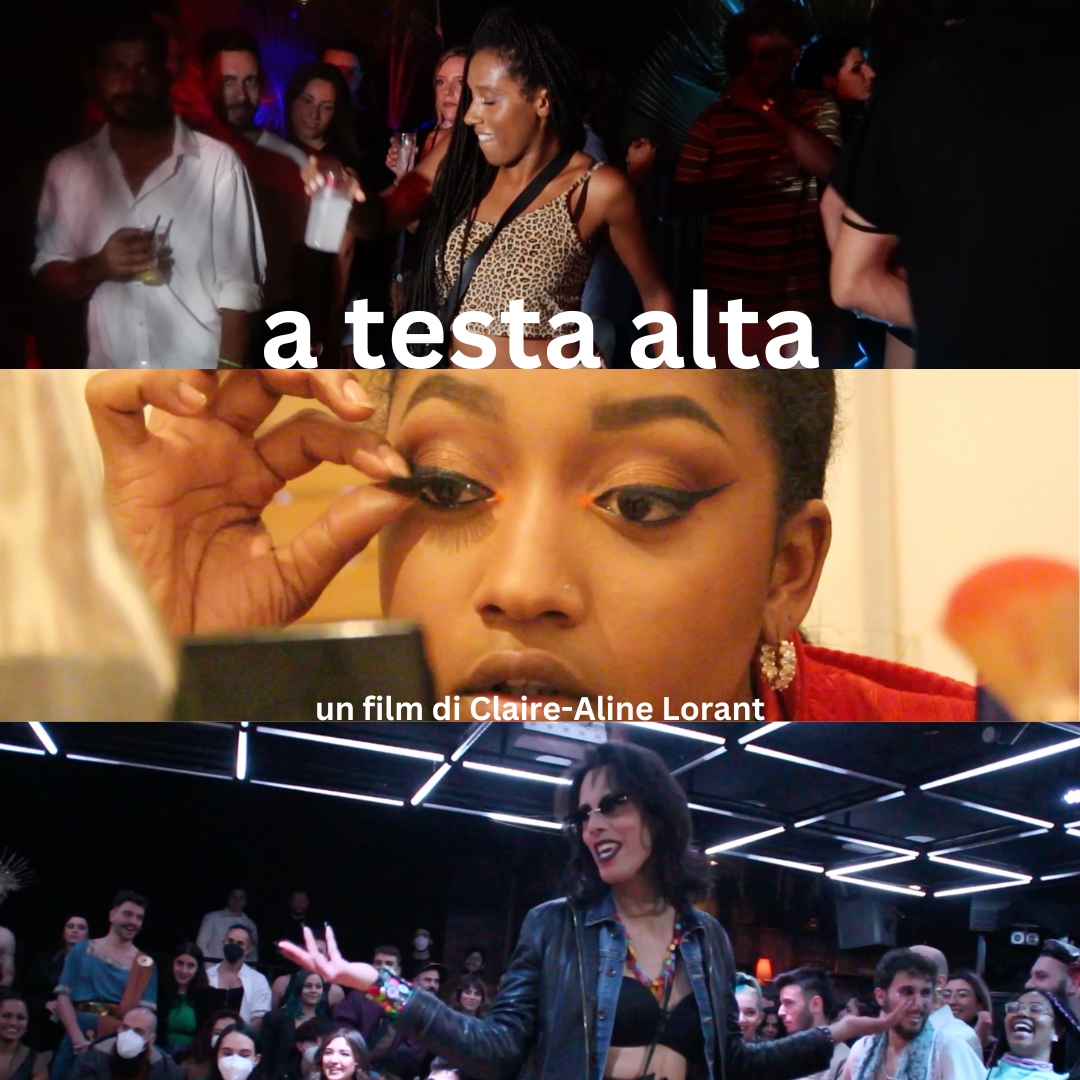
A TESTA ALTA
ITALY, 2023
30 min
Director: Claire-Aline Lorant
A testa alta ci catapulta nei meandri dell’underground musicale queer e afro di Napoli. I racconti e le riflessioni di Laura, Yvonne e Gea rivelano i codici e i linguaggi del Voguing e dell’Afrobeat, due sottoculture urbane tra loro affini e complementari, accomunate dall’urgenza di fare comunità e di esprimersi liberamente attraverso l’esibizione del corpo, con la danza a far da detonatore.
Il Voguing nasce come spazio in cui persone ai margini mettono in scena il proprio riscatto sociale e identitario tramite la condivisione, la performance e la competizione artistica che mima e rovescia i canoni delle sfilate di moda da rivista patinata, esclusive e inaccessibili. La ballroom diventa così un contenitore di inclusione orizzontale in cui confrontarsi e supportarsi, in cui sognare e sentirsi desiderat*. Non è un puro esercizio di stile, come potrebbe apparire a uno sguardo superficiale, bensì una forma di riaffermazione di genere depurata da (pre)giudizi esterni. Lo stesso vale per i raduni Afrobeat che, infuocati da ritmi africani e afroamericani, fortificano l’integrazione e rappresentano momenti di sovvertimento della visione dominante occidente-centrica e patriarcale.
La camera, impiegata come strumento etnografico di osservazione partecipata, si muove tra due piani: quello privato, individuale, retroscenico, e quello pubblico, performativo, di ribalta. L’intimità dei riti di preparazione e la dimensione iper-sociale dello spazio performativo lasciano emergere il netto contrasto tra il mondo fuori e il valore politico e personale.
Il film di Claire-Aline Lorant evidenzia il continuo sforzo di negoziazione volto a rispettare e promuovere le regole implicite per mantenere un ambiente sicuro, libero da discriminazioni, in cui coltivare la consapevolezza e rafforzare la presa di coscienza di sé per affrontare “a testa alta” una quotidianità ruvida e ancora inquinata da sessismo, razzismo, e transfobia.
Queste realtà intersezionali non vogliono però restare nascoste e isolate dalla vita di tutti i giorni. L’obiettivo, al contrario, resta quello di portare il discorso in superficie, di contagiare l’opinione pubblica, di mischiarsi con la folla. E Napoli, con la sua storia di accoglienza e la sua naturale attitudine all’apertura, sembra poter essere un teatro perfetto per valorizzare nuove forme espressive e dar voce al cambiamento.
Head held high catapults us into the meanders of the queer and Afro musical underground of Naples. The stories and reflections of Laura, Yvonne and Gea reveal the codes and languages of Voguing and Afrobeat, two urban subcultures similar and complementary to each other, united by the urgency of forming a community and expressing oneself freely through the exhibition of the body, with dance acting as the detonator.
Voguing was born as a space in which people on the margins stage their social and identity redemption through sharing, performance and artistic competition that mimics and overturns the canons of glossy magazine fashion shows, exclusive and inaccessible. The ballroom thus becomes a container of horizontal inclusion in which to discuss and support one another, in which to dream and feel desired. It is not a pure exercise in style, as it might appear at a superficial glance, but rather a form of gender reaffirmation purified of external (pre)judgments. The same goes for Afrobeat gatherings which, inflamed by African and African-American rhythms, strengthen integration and represent moments of subversion of the dominant Western-centric and patriarchal vision.
The camera, used as an ethnographic tool of participatory observation, moves between two levels: the private, individual, behind-the-scenes one, and the public, performative, front-stage one. The intimacy of the preparation rites and the hyper-social dimension of the performance space allow the clear contrast between the world outside and the political and personal value to emerge.
Claire-Aline Lorant’s film highlights the continuous effort of negotiation aimed at respecting and promoting the implicit rules to maintain a safe environment, free from discrimination, in which to cultivate awareness and strengthen self-awareness to face “head on ” a rough everyday life still polluted by sexism, racism, and transphobia.
However, these intersectional realities do not want to remain hidden and isolated from everyday life. The objective, on the contrary, remains that of bringing the discussion to the surface, of infecting public opinion, of mixing with the crowd. And Naples, with its history of hospitality and its natural attitude towards openness, seems to be a perfect theater to enhance new forms of expression and give voice to change.
